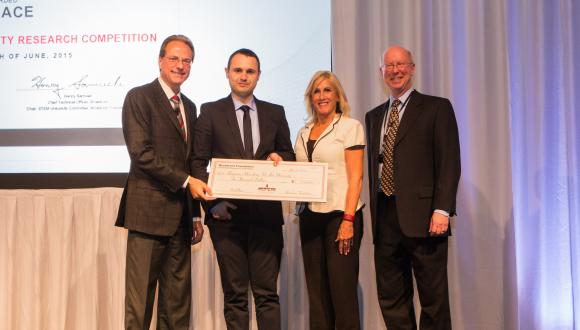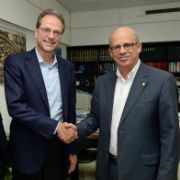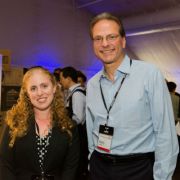TAU Student Takes First Prize at Broadcom Foundation University Research Competition
Tel Aviv University doctoral student at the Blavatnik School of Computer Science, Benjamin Klein, won first place at the fourth annual Broadcom Foundation University Research Program on June 4 in Irvine, California. His computer artificial intelligence project, "From Image to Text and Back Using Deep Learning," was awarded with an unrestricted cash prize of $10,000.
"We applaud the Broadcom Foundation's ongoing work to encourage student excellence and promote closer ties between industry and academia," said Prof. Joseph Klafter, President of Tel Aviv University. "This latest award also reinforces the alliance between Broadcom and the creativity, innovation, and quality of science and technology in Israel and at TAU."
"For the second year in a row, TAU graduate students have taken top honors in the Broadcom Foundation University Research Competition — last year with the silver and this year with the gold," added Paula Golden, President and Executive Director of Broadcom Foundation and Director of Community Affairs at Broadcom Corporation. "The consistent excellence in quality and depth of research by TAU graduate students is indicative of the university's status as a world-class center of innovation."
Sharing insight and innovation
Klein, 29, who was among finalists from 12 universities, shared insights into his engineering research and how its future application will contribute to the advancement of society. His project converts images and sentences to vectors, which are easier for a computer to understand. Then, using a huge data set, the computer matches sentences to images and vice versa, as well as actually creates sentences that apply to the images it “sees.” The computer learns to identify what it “sees” in the way a toddler learns to identify the world around him or her.
Klein believes that with further development, the project can be used to help the visually impaired. For example, when waiting at a cross walk, a small computer worn as a pair of glasses would be able to “see” the red light and traffic and formulate a sentence telling the wearer not to cross, which can then be read aloud to the wearer by text-to-speech software.
For Klein, winning the competition was only part of the fun. “It was very nice to see people taking an interest in the project and asking questions,” he said of the engineers who judged the contest. More than 400 distinguished Broadcom engineers judged the finalists on a three-minute presentation with a single slide and a four-hour poster session where they demonstrated the scientific rigor, technological sophistication, and innovation of their work. “I am so happy and grateful both to Broadcom and to my supervisor, Prof. Lior Wolf from the Blavatnik School of Computer Science,” Klein said after the competition. “I really feel that this has been an amazing experience.”
Henry Samueli, Broadcom Corporation's co-founder and chairman of the board, spearheaded the competition to celebrate both academic excellence and social awareness by graduate students whose engineering innovations will yield unlimited benefits to society at large.
Broadcom Foundation's mission is to advance education in science, technology, engineering, and mathematics (STEM) by funding research, recognizing scholarship, and increasing opportunity. The goal of the University Research Competition is to encourage young researchers throughout the world to become the next generation of great innovators in electrical engineering and related fields.
The competition strengthens the already strong link between TAU and international partners like the Broadcom Foundation. Broadcom Vice President Dr. Shlomo Markel also serves as the Chairman of the Board of RAMOT, TAU's technology transfer organization.
As originally reported by AFTAU.






